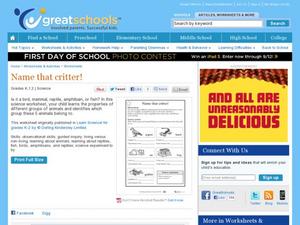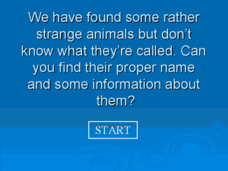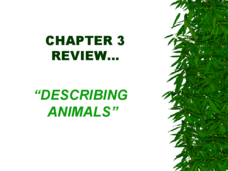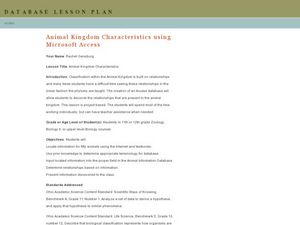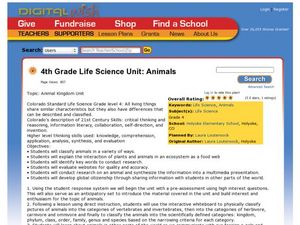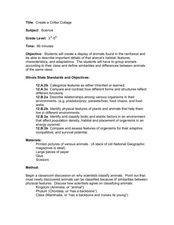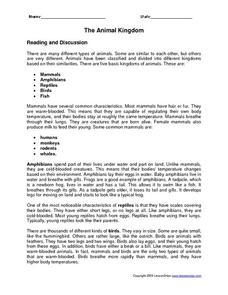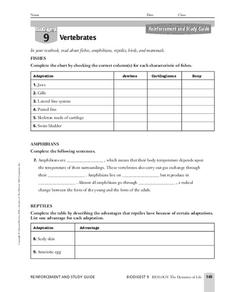Curated OER
Name That Critter
Young learners classify five different animals into their proper category. The animals pictured are a pigeon, a lizard, a cat, a frog, and a goldfish. Pupils are also asked to tell why they know it's a certain kind of animal. An...
Curated OER
All About Arthropods
Use a dichotomous key to classify these squirmy bugs. A paragraph provides fifth graders with some background knowledge on the animal kingdom, and explains how to use a branching key for classification. They then determine which bugs...
Curated OER
Animals Belong in Class
In this classifying animals worksheet, students use the information in the word bank to complete the T-Chart about mammals, birds, fish, reptiles, amphibians, and arthropods. Students write 10 answers.
Curated OER
Classify Animals
Give your class an idea of how animals are classified by scientists with this interactive PowerPoint activity. They are presented with six different animals, they answer yes or no questions until only one animal remains alongside...
Curated OER
Echinoderms
Echinoderm structure and characteristics are the focus of this reading comprehension and labeling worksheet. Attractive diagrams and ample information make this a suitable homework assignment for your biology buffs when learning about...
Curated OER
Around-The-World-Zoo
Junior biologists design and maintain a website about a zoo by researching, classifying, and providing the correct habitats for the animals they choose to have in their zoo. This technology-based project can last over an entire semester...
Curated OER
Animal-mania
Students explore the concept of scientific classification systems using a guided Internet research activity. They answer specific questions on the classification of animals by exploring a different Internet link for each question.
Curated OER
Family Lesson Plan
Kindergarteners discuss families with this resource. They talk about human families, explaining how they grow and change, and focus on vocabulary words. Then, they talk about animal families, discuss the vocabulary involved, and match...
Curated OER
A Tooth for a Tooth
Learners classify mammals as carnivores or herbivores. They look at a set of pictures of animal skulls, observing the shape and size of the teeth, and identify herbivores and carnivores.
Curated OER
Describing Animals
While a short review of animals and their classifications, this could be useful when discussing this topic in the classroom. There is a list of questions at the end to help review the main ideas. Reptiles, amphibians, and mammals are...
Curated OER
Taxonomy Concept Map
Reinforce learners' knowledge of scientific taxonomy with a helpful concept map learning exercise. Using a word bank, young biologists fill in the blanks to complete the description of organism classification.
Curated OER
Animal Characteristics
Students investigate biology by completing a group classification activity. In this animal characteristics, students discuss the different families in the animal kingdom and the small differences that separate the animals. Students...
Curated OER
Academic Raceway: Animals
This animals PowerPoint provides a race car game in which students answer a variety of questions about animals, the majority of which are based on ways in which animals adapt to their surroundings and behave to survive.
Curated OER
Sunken Millions Animals
This PowerPoint includes a game with ocean graphics in which two teams answer increasingly difficult questions about animals. Topics covered include plant and animal cells, animal adaptation, and similarities and differences between...
Curated OER
Invertebrates
Students examine invertebrates. In this animal classification lesson, students discuss invertebrates and bilateral symmetry. They discuss the importance of horse shoe crabs in medical science.
Curated OER
Classifying Vertebrates
Second graders study animal characteristics and classification. In this animal characteristics and classifications lesson, 2nd graders determine how to classify vertebrates which include mammals, reptiles, amphibians, birds, and fish....
Curated OER
Animal Kingdom Characteristics using Microsoft Access
Students create a computer database to discover relationships present in the Animal Kingdom. In this classification lesson, students enter data into a Microsoft Access database. They answer questions on a worksheet and create a visual...
Curated OER
What's Your Classification
Students classify animals. In this animal groups lesson, students watch a video on animal groups and review the six animal groups. Students practice classifying animals using stuffed animals.
Curated OER
4th Grade Life Science Unit: Animals
Fourth graders classify animals. In this animal kingdom lesson, 4th graders research animal habitats and behaviors. Students connect to a zoologist via SKYPE and learn about animal classification. Students blog about preserving animal...
Curated OER
Create a Critter Collage
Young scholars create a collage. In this animal classification lesson plan, students discuss why and how scientists classify animals. Young scholars view pictures of different animals and decide which class each animal belongs to....
Curated OER
Species Charades
Students identify endangered species. In this endangered species lesson plan, the teacher leads a discussion about endangered species, then the class plays a game of charades to pantomime animal behavior.
Curated OER
Taxonomy, Classification, and Dichotomous Keys
In this taxonomy worksheet, students use a dichotomous key for creatures found on planet Pamishan to identify each individual creature. This worksheet has 20 creatures to identify.
Curated OER
The Animal Kingdom
For this animal kingdom worksheet, students read for information and determine comprehension. In this matching and fill in the blanks worksheet, students answer twelve questions.
Curated OER
Vertebrates
In this vertebrate activity, learners review the different adaptations for the 5 groups of vertebrates: birds, mammals, reptiles, amphibians, and fishes. This activity has 12 matching, 1 fill in the blank, and 7 short answer questions.


